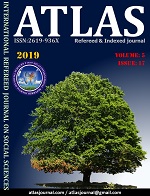ECONOMICAL IMPACTS OF CORRUPTION: THE CASE OF TURKEY
DOI:
https://doi.org/10.31568/atlas.267Keywords:
Corruption, Economy, Turkey, Transparency, InvestmentAbstract
Corruption is one of the basic issues which are most debated on globally and which is searched for solution to overcome. It is going to be a mistake to evaluate it rigidly. It is not possible to make a certain definition of corruption which is perceived as a matter in national and international level. The most basic hypothesis in economy is that a rational person tries to maximise his own benefit. Those people who consider their own benefits from the society in as much as, corruption is seen everywhere which is related with human beings and it costs everyone in a society. As being in every field, also in economy, corruption leads to its destructive effects. The conflict of interest, which is out of control day by day and increasing unreasonably, especially recently, corruption has reached unpredictable dimensions with the impact of globalization. Within this scope, the aim of the thesis is to deal with the concept of corruption extensively. In this context the definition, the components, taking reference to the patterns which are used for explaining corruption in economy. All harms of corruption, caused by economical effects, are supported with various empirical studies by being investigated economically. The samples of corruption in the world and in Turkey are examined within this scope, being taken precautions towards corruption in Turkey mentioned. As a consequence of the study, it is determined that there are corruptions in every area where human factors are but in Turkey there are a lot of regulations to struggle with corruption and these regulations are effective just for minor corruptions. However, they are not enough for struggling with major ones.
Downloads
Published
How to Cite
Issue
Section
License

This work is licensed under a Creative Commons Attribution-NonCommercial 4.0 International License.


